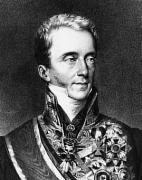Franz Anton von Kolowrat-Liebsteinsky
Franz Anton Graf von Kolowrat-Liebsteinsky | |
|---|---|
 Count Franz Anton von Kolowrat | |
| 1st Minister-President of the Austrian Empire | |
| In office 20 March 1848 – 4 April 1848 | |
| Monarch | Ferdinand I |
| Preceded by | Klemens von Metternich (as State Chancellor) |
| Succeeded by | Karl Ludwig von Ficquelmont |
| Interior Minister of the Austrian Empire | |
| In office 29 September 1826 – 20 March 1848 | |
| Monarchs | Francis I Ferdinand I |
| Preceded by | Károly Zichy |
| Succeeded by | Franz von Pillersdorf |
| Personal details | |
| Born | 31 January 1778 Prague, Bohemia |
| Died | 4 April 1861 (aged 83) Vienna, Austria |
Count Franz Anton von Kolowrat-Liebsteinsky (Template:Lang-cs; 31 January 1778 – 4 April 1861) was a Bohemian noble and Austrian statesman. As a moderate liberal politician, he was one of the major opponents of State Chancellor Prince Klemens von Metternich during the Vormärz era.
Life
He was born in Prague, the son of the Czech Kolowrat (Kolovratové) noble family, whose ancestors had already served under the Luxembourg emperor Charles IV. Franz Anton finished his studies in 1799. During the Napoleonic Wars he achieved the office of a stadtholder of the Habsburg emperor Francis I of Austria at Prague and in 1810 became Oberstburggraf of the whole Bohemian kingdom. Contrary to Chancellor Metternich, he encouraged Czech cultural and civic-national movements, exemplified by the founding of the Prague National Museum in 1818.
Kolowrat's rivalry with Metternich intensified when in 1826 the emperor called him to Vienna, where he was elevated to a member of the Austrian State Council responsible for the Interior and Finances. The tensions between him and the chancellor continued: while Metternich favored a strong army, Kolowrat reduced the military budget.[1] After the accession of Francis' incapable son Ferdinand I to the throne in 1835, Kolowrat together with Metternich led the Secret State Conference, the de facto government of the Empire from 1836 to 1848. However the continuous disagreement between the two leaders palsied the Austrian politics and ultimately contributed to the outbreak of the Revolutions of 1848. When Metternich had to resign, Kolowrat assumed the newly created office of an Austrian Minister-President, which he nevertheless laid down after only one month between 3–5 April, officially for health reasons.
Kolowrat died in Vienna.
Decorations
- Order of the Golden Fleece
- Order of Leopold
- Order of St. Andrew
- Order of St. Anna
- Order of St. Vladimir
- Order of the White Eagle
- Order of Alexander Nevsky
- Venerable Order of Saint John
References
- ^ Rothenburg, G. The Army of Francis Joseph. West Lafayette: Purdue University Press, 1976. p 10.

